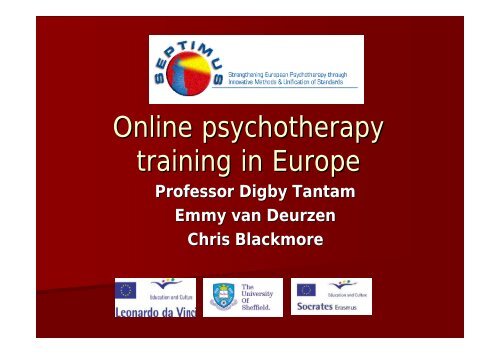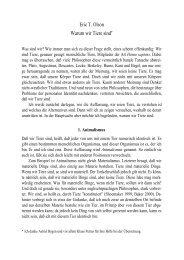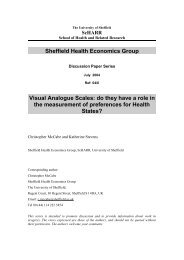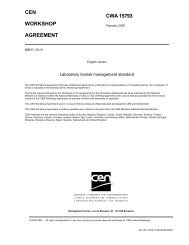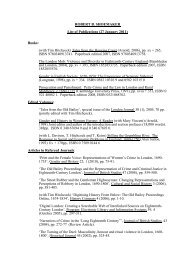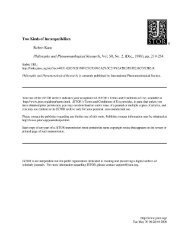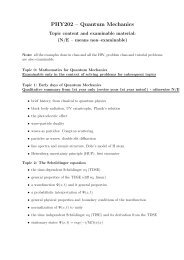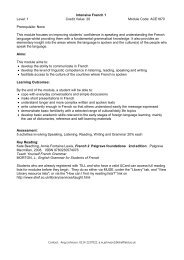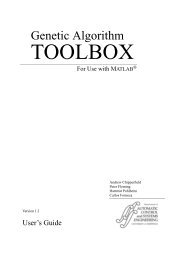An introduction to our eLearning materials - University of Sheffield
An introduction to our eLearning materials - University of Sheffield
An introduction to our eLearning materials - University of Sheffield
Create successful ePaper yourself
Turn your PDF publications into a flip-book with our unique Google optimized e-Paper software.
Online psychotherapy<br />
training in Europe<br />
Pr<strong>of</strong>essor Digby Tantam<br />
Emmy van Deurzen<br />
Chris Blackmore
Introduction <strong>to</strong> SEPTIMUS<br />
• “Strengthening European Psychotherapy through<br />
Innovative Methods and Unification <strong>of</strong> Standards”<br />
• A Leonardo-funded three year project<br />
• Co-ordinated ordinated from the UK at the Centre for Study<br />
<strong>of</strong> Conflict and Reconciliation by Pr<strong>of</strong> Digby<br />
Tantam and Pr<strong>of</strong> Emmy van Deurzen<br />
• Designed <strong>to</strong> widen accessibility <strong>to</strong> psychotherapy<br />
training by <strong>of</strong>fering places <strong>to</strong> those normally<br />
excluded on the basis <strong>of</strong>:<br />
1. Geographical isolation from training centres<br />
2. Disability/mobility issues<br />
3. Work/family commitments
Introduction (contd.)<br />
• 8 countries involved in SEPTIMUS- Austria,<br />
Czech Republic, Ireland, Italy, Poland,<br />
Portugal, Romania, UK<br />
• UK (<strong>Sheffield</strong> <strong>University</strong>) set up the Virtual<br />
Learning Environment (VLE) and gave access<br />
<strong>to</strong> other institutes<br />
• VLE consisted <strong>of</strong>:<br />
A. Webpages (for the c<strong>our</strong>se material)<br />
B. Discussion forums (for student interaction and<br />
learning)<br />
C. Chatroom (for student interaction and<br />
learning)
A. SEPTIMUS Webpages<br />
6 Units <strong>of</strong> c<strong>our</strong>se material-<br />
1. health and well-being<br />
2. existential and human issues<br />
3. conflict and reconciliation<br />
4. Overview <strong>of</strong> different methods <strong>of</strong> psychotherapy<br />
and personal change<br />
5. Ethics and culture in psychotherapy and<br />
counselling<br />
6. Development through the life-cycle: normal,<br />
distressing, and disabling<br />
• Entrance <strong>to</strong> c<strong>our</strong>se is via www.septimus.info
B. Discussion Forums<br />
• For asynchronous discussion about the c<strong>our</strong>se<br />
material<br />
• Standard model with any number <strong>of</strong> forums for<br />
each country plus some general ones<br />
• Clear structure with easy <strong>to</strong> follow threads<br />
• S<strong>of</strong>tware supports foreign language characters<br />
• <strong>An</strong> International Discussion Forum set up <strong>to</strong><br />
capitalise on the transnational aspect <strong>of</strong> the c<strong>our</strong>se
C. Chatrooms<br />
• Chatrooms created using phpBB2<br />
• One archived chatroom so that students can<br />
review what has been said during a chatroom<br />
tu<strong>to</strong>rial<br />
• One unarchived chatroom is available so that<br />
students can discuss confidential or sensitive<br />
material online
Questions<br />
Do students enjoy this kind <strong>of</strong> study?<br />
Do they prefer it <strong>to</strong> traditional “face-<strong>to</strong>-face” teaching<br />
methods?<br />
Are tu<strong>to</strong>rs satisfied with their learning?<br />
Has the programme widened accessibility <strong>to</strong> training?<br />
To answer these questions, data was collected from<br />
each student:<br />
• application data<br />
• feedback from student on each unit (32 item<br />
questionnaire)<br />
• feedback on student’s s progress from tu<strong>to</strong>r<br />
• data on their use <strong>of</strong> VLE
Do students enjoy this kind <strong>of</strong> study?<br />
• At the end <strong>of</strong> each Unit, students were<br />
given a 32-item feedback questionnaire on<br />
all aspects <strong>of</strong> the c<strong>our</strong>se<br />
• Data from 156 students show variation<br />
between countries:
SEPTIMUS student feedback Oct 2002 - June 2004<br />
1- Not at all; 2- A little; 3- Medium; 4- Quite a lot; 5- Very much<br />
Average rating (Likert scale)<br />
5<br />
4<br />
3<br />
2<br />
1<br />
Satisfaction<br />
with c<strong>our</strong>se<br />
<strong>materials</strong><br />
Understanding<br />
<strong>of</strong> <strong>to</strong>pic<br />
Average<br />
satisfaction<br />
with c<strong>our</strong>se<br />
<strong>materials</strong><br />
Average<br />
understanding<br />
<strong>of</strong> <strong>to</strong>pic<br />
U K<br />
Italy<br />
Austria<br />
R omania<br />
Pola nd<br />
Portu gal<br />
C zechR ep<br />
Irela nd<br />
Country
Do students enjoy this kind <strong>of</strong> study?<br />
Data suggests that students are fitting in SEPTIMUS<br />
around their normal work patterns:<br />
• Peaks in activity before and after work, and at lunchtime<br />
• More study done during the week (and the most on<br />
Mondays)
H<strong>our</strong>ly Total <strong>of</strong> website hits Oc<strong>to</strong>ber 2002-June 2004<br />
2500<br />
N o . o f h i t s<br />
2000<br />
1500<br />
1000<br />
500<br />
H<strong>our</strong>ly Total<br />
0<br />
0 0 : 0 0<br />
0 2 : 0 0<br />
0 4 : 0 0<br />
0 6 : 0 0<br />
0 8 : 0 0<br />
1 0 : 0 0<br />
1 2 : 0 0<br />
1 4 : 0 0<br />
1 6 : 0 0<br />
1 8 : 0 0<br />
2 0 : 0 0<br />
2 2 : 0 0<br />
Time
SEPTIMUS online mcq submission,<br />
Oct 03- June 04<br />
Frequency <strong>of</strong> mcqs<br />
submitted<br />
300<br />
250<br />
200<br />
150<br />
100<br />
50<br />
0<br />
mcq submissions<br />
1am<br />
3am<br />
5am<br />
7am<br />
9am<br />
11am<br />
1pm<br />
3pm<br />
5pm<br />
7pm<br />
9pm<br />
11pm<br />
Time
Daily Total <strong>of</strong> sessions Oc<strong>to</strong>ber 2002-June<br />
2004<br />
no. <strong>of</strong> sessions<br />
140<br />
120<br />
100<br />
80<br />
60<br />
40<br />
20<br />
0<br />
Mon Tue Wed Thu Fri Sat Sun<br />
day <strong>of</strong> week<br />
Daily Total
Distribution <strong>of</strong> page hits (without chatroom) for<br />
SEPTIMUS January- May 2004<br />
Other<br />
1%<br />
Community pages<br />
2%<br />
C<strong>our</strong>se Atlas<br />
15%<br />
C<strong>our</strong>se pages<br />
14%<br />
C<strong>our</strong>se Atlas<br />
Discussion Forum<br />
C<strong>our</strong>se pages<br />
Community pages<br />
Other<br />
Discussion Forum<br />
68%
Do students prefer <strong>eLearning</strong> <strong>to</strong><br />
traditional methods?<br />
• We also did a study <strong>to</strong> compare student<br />
satisfaction and performance with online vs.<br />
traditional psychotherapy training c<strong>our</strong>ses<br />
• In Romania, Ireland and the UK, students who<br />
had completed a psychotherapy training c<strong>our</strong>se<br />
by traditional classroom teaching were recruited<br />
• 59 students were given a 32-item questionnaire<br />
<strong>to</strong> complete asking for feedback on traditional<br />
teaching methods for psychotherapy<br />
• This was compared with existing data from<br />
SEPTIMUS students
Do students prefer <strong>eLearning</strong> <strong>to</strong><br />
traditional methods?<br />
• When comparing the e-learners e<br />
(n= approx<br />
111) with traditional learners (n=61), the results<br />
seem consistently more fav<strong>our</strong>able for the e-e<br />
learning method<br />
• Students appear <strong>to</strong> spend much longer engaged<br />
in learning with e-learning e<br />
c<strong>our</strong>ses<br />
• Presumably this learning is <strong>of</strong> a different<br />
sort/intensity<br />
• NB- there is no guarantee <strong>of</strong> the equivalence <strong>of</strong><br />
the two types <strong>of</strong> c<strong>our</strong>ses
Are tu<strong>to</strong>rs satisfied with their learning?<br />
• Partner and tu<strong>to</strong>r feedback says that they are<br />
very satisfied with the quality <strong>of</strong> the c<strong>our</strong>se<br />
material<br />
• The performance <strong>of</strong> students is comparable <strong>to</strong><br />
traditional c<strong>our</strong>ses<br />
• So long as tu<strong>to</strong>rs establish confidentiality,<br />
openness and trust, the online environment<br />
seems <strong>to</strong> enc<strong>our</strong>age students <strong>to</strong> engage in far<br />
more self-disclosure <strong>of</strong> personal material than is<br />
usually the case in classroom-based material<br />
• So students are able <strong>to</strong> apply the c<strong>our</strong>se material<br />
more directly <strong>to</strong> their own experience
Has SEPTIMUS widened accessibility <strong>to</strong><br />
psychotherapy training?<br />
Application data says that <strong>of</strong> 156 students who enrolled:<br />
• over 50% live further than 100 km from the training centre<br />
• 7% have a disability<br />
• 65% have been prevented from previously applying for training<br />
Of these, the most common reasons were:<br />
• lack <strong>of</strong> practical experience/ academic qualifications (60%)<br />
• financial limitations (54%)<br />
• geographical distance (56%)<br />
• childcare responsibilities (19%)<br />
So SEPTIMUS has achieved its main goal <strong>of</strong> widening accessibility<br />
<strong>to</strong> psychotherapy training by using e-learning e<br />
methods. But is it<br />
preferable <strong>to</strong> traditional ways <strong>of</strong> teaching psychotherapy?
The Future<br />
• The project finished in Oc<strong>to</strong>ber 2004<br />
• The units will continue <strong>to</strong> be available in the UK<br />
through <strong>Sheffield</strong> <strong>University</strong> Masters in Medical and<br />
Health Sciences (Psychotherapy Studies pathway)<br />
• Other countries are making similar moves <strong>to</strong> integrate<br />
SEPTIMUS units in<strong>to</strong> their own training programmes<br />
• <strong>An</strong> application has been made for a Leonardo-funded<br />
project <strong>to</strong> disseminate SEPTIMUS <strong>to</strong> up <strong>to</strong> 27 other<br />
European countries where SEPT reported that<br />
psychotherapy training by distance learning is needed
The Future<br />
• A further project started in Oc<strong>to</strong>ber 2004 called DEEP-<br />
Dissemination <strong>of</strong> European Education in Psychotherapy<br />
• DEEP project is <strong>to</strong> create a new Masters level c<strong>our</strong>se in<br />
a <strong>University</strong><br />
• Funded by the ERASMUS fund <strong>of</strong> the SOCRATES<br />
programme<br />
• Incorporates SEPTIMUS material
The Future<br />
• Designed <strong>to</strong> give students the theoretical knowledge<br />
required <strong>to</strong> become psychotherapists<br />
• May be studied alongside a practical component (local<br />
supervised placement, personal therapy)<br />
• These <strong>materials</strong> will be integrated in<strong>to</strong> <strong>University</strong>-based<br />
psychotherapy training c<strong>our</strong>ses in:<br />
Austria (Sigmund Freud <strong>University</strong>)<br />
Sweden (Linkopping(<br />
<strong>University</strong>)<br />
Czech Republic (Masaryk(<br />
<strong>University</strong>)<br />
Romania (Hyperion <strong>University</strong>) and<br />
UK (<strong>Sheffield</strong> <strong>University</strong>)


